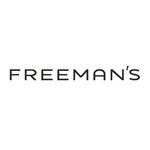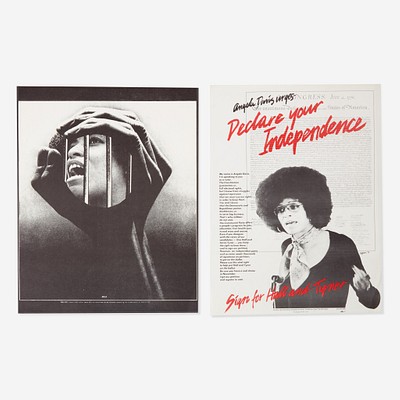[Native-Americana] [Quakers] Printed Bond, signed
About Seller
2400 Market St
Philadelphia, PA 19147
United States
Established in 1805, Freeman’s Auction House holds tradition close, with a progressive mind-set towards marketing and promotion, along with access to a team of top experts in the auction business. And now with offices in New England, the Southeast, and on the West Coast, it has never been easier to ...Read more
Two ways to bid:
- Leave a max absentee bid and the platform will bid on your behalf up to your maximum bid during the live auction.
- Bid live during the auction and your bids will be submitted real-time to the auctioneer.
Bid Increments
| Price | Bid Increment |
|---|---|
| $0 | $25 |
| $500 | $50 |
| $1,000 | $100 |
| $2,000 | $200 |
| $3,000 | $250 |
| $5,000 | $500 |
| $10,000 | $1,000 |
| $20,000 | $2,000 |
| $30,000 | $2,500 |
| $50,000 | $5,000 |
| $100,000 | $10,000 |
About Auction
Sep 23, 2021
A collection of books and manuscripts. Curated by Darren WInston, Head of the Books and Manuscripts Department at Freeman's. Freeman's info@freemansauction.com
- Lot Description
[Native-Americana] [Quakers] Printed Bond, signed
A prominent Philadelphia Quaker invests in maintaining peaceful coexistence with Pennsylvania's Indigenous peoples
(Philadelphia), May 14, 1759. One sheet, 6 1/2 x 8 1/8 in. (165 x 206 mm). Partially-printed interest-bearing bond for £200 pounds (No. 13), registered to Richard Wistar, and issued and signed by the nine commissioners for Indian Affairs of the Province of Pennsylvania, including Joseph Richardson, Thomas Willing, James Child, Amos Swettell, William West, John Reynell, Joseph Morris, William Fisher, and Edward Pennington; MS. on verso recording yearly interest amounts paid, signed by Wistar, as well as by his brother, Caspar, and his wife, Sarah; docketed on same. Creasing from original folds; lightly toned.
This rare colonial Pennsylvania interest-bearing bond, issued in 1759, attests to the role of Quaker diplomacy in helping ameliorate relations between Pennsylvania's settler population and their indigenous neighbors during the Seven Years War (1756-63). Issued to Richard Wistar (1727-81), of the prominent Philadelphia Wistar family (son of Quaker glassmaker Caspar Wistar [1696-1752], and father of noted physician and anatomist, Caspar Wistar [1761-1818], the younger), he invested £200 in the newly established board of Indian Affairs, and received 6% interest per year, paid out annually. He and his family collected until April 1763, around the time the board was dissolved. The £200 was used by the board for Indian Affairs to regulate trade, maintain peaceful relations, and expand Christian proselytizing efforts with the Province's native peoples in the frontier region in the west and in the north. It was made up of prominent Philadelphia and Quaker merchants, and was established by an act passed the previous year, on April 8, 1758 (supplemented on April 17, 1859, for which this bond helped fund), entitled, âAn Act for preventing Abuses in the Indian Trade for supplying the Indians, Friends and Allies of Great Britain, with Goods at more easy Rates and for securing and Strengthening the peace and Friendship lately concluded with the Indians Inhabiting the northern and Western Frontiers of this Province."
The Indian Affairs commission sprang out of the political and social upheaval that occurred in 1750's Pennsylvania. Decades of territorial expansion by white settlers onto native land, often with the aid of the proprietary government led by the Penn family, and the subsequent cooperation of many of those native tribes with the French leading up to the Seven Years War, led to unprecedented violence in the frontier regions. Richard Wistar, a prominent, and philanthropically-minded Philadelphia-based Quaker merchant, was a founding member and trustee of an important Quaker peace delegation that sought to stop this turmoil through nonviolent means, the Friendly Association for Regaining and Preserving Peace with the Indians by Pacific Measures. It was formed with the purpose of directly negotiating with the region's native peoples, specifically the various Delaware tribes that made up a large portion of the province's native population. The Friendly Association was formally established on December 1, 1756, by Phialdelphia merchant, Israel Pemberton, Jr., and 11 officers, including Wistar, John Reynell (treasurer), Joseph Richardson, and Joseph Morris (all three members of the Indian Affairs board, and signatories of this document), as well as, William Callender, Abel James, Jonathan Mifflin, James Pemberton, Jeremiah Warder, and Isaac Zane. Its members raised funds and provided gifts to native tribes, and organized peace negotiations between them and British colonial officials in Lancaster and Easton, Pennsylvania (where Wistar was frequently present as a delegate representing the Association, including the signing of the Treaty of Easton in 1758).
The establishment of the Indian Affairs board was one facet in the culmination of years of political wrestling between the Provincial Assembly and the Penn family over control of the province's affairs, of which native relations, such as supervising the province's Indian agents and interpreters, was becoming paramount to the defense and peace of the colony. With the establishment of the board the commissioners were given the means to regulate trade with the native people and thereby attempt to keep relations between them peaceful. The Friendly Association, Wistar included, were instrumental in the boards functioning. As Robert Daiutolo, Jr. explains concerning the role the Indian Affairs board played, and its relation to the Friendly Association, "...Private trader's were already working the region because earlier in 1758 the provincial government had enacted a law that licensed them to do so, if they forbore selling Indians liquor. The act had also established a heretofore unrealized system of trading stores for the purpose of bringing the Ohio Indians into the English camp. The Friendly Association, of course, had thrown the full weight of its monetary resources behind the enterprise from the start, and its treasurer, John Reynell, had been needfully and respectfully selected by the Assembly to head the commission whose task was to implement the plans." (Daiutolo, The Role of Quakers in Indian Affairs During the French and Indian War, Quaker History Vol. 77, No. 1 [Spring 1988], pp. 1-30). The board was eventually disbanded in 1763, but Wistar and his Quaker brethren would continue to host and aid native tribes in the Philadelphia region, and provide them with goods and aid. By 1776, Wistar had formed the Philadelphia Society for Assisting Distressed Prisoners, an early penal reform society.
A previous cataloger called this "excessively rare," and stated, "This is the earliest American interest-bearing bond we have encountered, and the purpose for which it was issued was important..." A fine example. We can locate only two similar documents in the auction record. - Shipping Info
-
No lot may be removed from Freeman’s premises until the buyer has paid in full the purchase price therefor including Buyer’s Premium or has satisfied such terms that Freeman’s, in its sole discretion, shall require. Subject to the foregoing, all Property shall be paid for and removed by the buyer at his/ her expense within ten (10) days of sale and, if not so removed, may be sold by Freeman’s, or sent by Freeman’s to a third-party storage facility, at the sole risk and charge of the buyer(s), and Freeman’s may prohibit the buyer from participating, directly or indirectly, as a bidder or buyer in any future sale or sales. In addition to other remedies available to Freeman’s by law, Freeman’s reserves the right to impose a late charge of 1.5% per month of the total purchase price on any balance remaining ten (10) days after the day of sale. If Property is not removed by the buyer within ten (10) days, a handling charge of 2% of the total purchase price per month from the tenth day after the sale until removal by the buyer shall be payable to Freeman’s by the buyer. Freeman’s will not be responsible for any loss, damage, theft, or otherwise responsible for any goods left in Freeman’s possession after ten (10) days. If the foregoing conditions or any applicable provisions of law are not complied with, in addition to other remedies available to Freeman’s and the Consignor (including without limitation the right to hold the buyer(s) liable for the bid price) Freeman’s, at its option, may either cancel the sale, retaining as liquidated damages all payments made by the buyer(s), or resell the property. In such event, the buyer(s) shall remain liable for any deficiency in the original purchase price and will also be responsible for all costs, including warehousing, the expense of the ultimate sale, and Freeman’s commission at its regular rates together with all related and incidental charges, including legal fees. Payment is a precondition to removal. Payment shall be by cash, certified check or similar bank draft, or any other method approved by Freeman’s. Checks will not be deemed to constitute payment until cleared. Any exceptions must be made upon Freeman’s written approval of credit prior to sale. In addition, a defaulting buyer will be deemed to have granted and assigned to Freeman’s, a continuing security interest of first priority in any property or money of, or owing to such buyer in Freeman’ possession, and Freeman’s may retain and apply such property or money as collateral security for the obligations due to Freeman’s. Freeman’s shall have all of the rights accorded a secured party under the Pennsylvania Uniform Commercial Code.
-
- Buyer's Premium



 EUR
EUR CAD
CAD AUD
AUD GBP
GBP MXN
MXN HKD
HKD CNY
CNY MYR
MYR SEK
SEK SGD
SGD CHF
CHF THB
THB![[Native-Americana] [Quakers] Printed Bond, signed](https://s1.img.bidsquare.com/item/l/9242/9242487.jpeg?t=1MmbGf)
![[Native-Americana] [Quakers] Printed Bond, signed](https://s1.img.bidsquare.com/item/s/9242/9242487.jpeg?t=1MmbGf)











